Introduction — make your browser work for your brain
If you spend hours learning inside a browser, small friction points add up: scattered notes, too many tabs, distractions, and messy citation hunting. That’s why google chrome extensions are a game-changer for students, lifelong learners, and remote professionals. The right extensions act like little assistants — clipping articles, organizing tabs, checking grammar, and blocking distractions — so you can focus on the actual learning.
This guide picks the best extensions for online learning in 2025, explains why each one matters, and shows how to combine them into a study workflow that actually sticks.
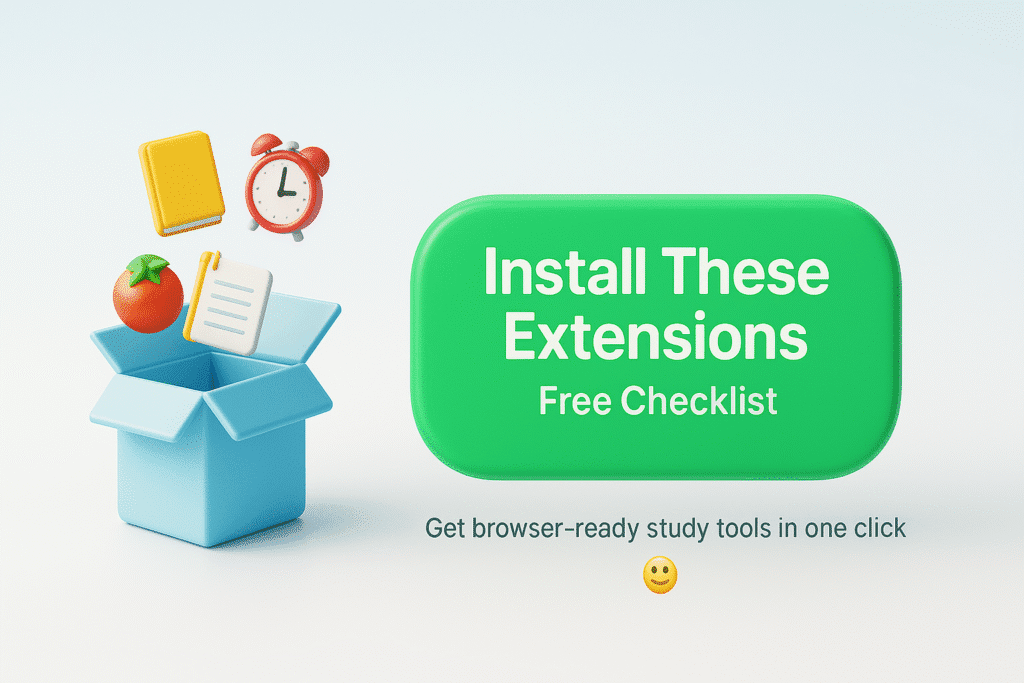
Quick comparison: at-a-glance table
| Extension | Best for | Quick benefit |
|---|---|---|
| Grammarly | Writing & proofreading | Real-time grammar + tone suggestions. Grammarly |
| OneTab | Tab management | Collapse tabs to save memory and focus. Chrome Web Store |
| Notion Web Clipper | Research & note capture | Clip pages into Notion databases (organize instantly). Notion+1 |
| uBlock Origin | Distraction & privacy | Blocks ads and speeds up pages (fewer interruptions). Lifewire |
| Todoist (or Momentum) | Task & habit tracking | Turn lessons into actionable tasks and daily routines. Zapier |
How I use these tools (a short real-world workflow)
When I prepare a lesson or research topic, I follow three simple steps:
- Collect — clip promising articles straight into Notion while tagging them for later. (Notion Web Clipper saves me from “where did I see that?” moments). Notion
- Tidy — collapse dozens of open tabs into OneTab after a research sprint; this reduces browser memory use and keeps the desktop calm. Chrome Web Store
- Polish & schedule — draft write-ups in Chrome and let Grammarly catch tone and grammar issues; add follow-up tasks to Todoist to turn research into study blocks. GrammarlyZapier
That three-step loop (collect → tidy → polish) transformed hours of chaotic browsing into focused study sessions.
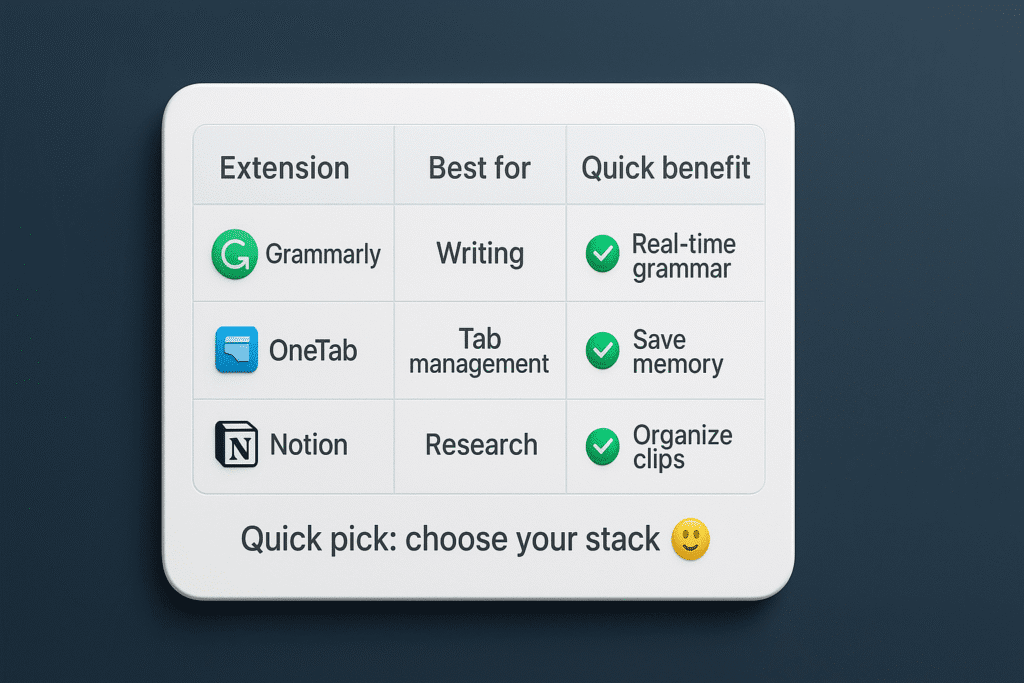
Deep dive: Top extensions and why they matter
1. Grammarly — make every submission count
If you write essays, forum posts, or discussion replies, a clean and confident submission matters. Grammarly’s Chrome extension gives real-time grammar, clarity, and tone suggestions across Google Docs, Gmail, discussion boards, and LMS interfaces. It also includes plagiarism and citation helpers in paid tiers, which can be handy for academic work. For drafting and polishing quick replies, Grammarly saves time and avoids embarrassing mistakes. Grammarly+1
Best use: Draft class discussion posts and proofread assignment drafts before submission.
2. OneTab (or Workona) — defeat tab overload
If your browser looks like a messy lab bench after one research session, OneTab is the simplest cleanup tool: one click converts your open tabs into a single list you can restore later. Alternatives like Workona offer richer session management for students juggling multiple courses. Reducing tab clutter not only improves performance but also decreases cognitive load. Chrome Web Storebookmarkify.io
Best use: Save an entire research session before switching to focused writing.
3. Notion Web Clipper (or Evernote Web Clipper) — clip, categorize, repeat
Capturing useful pages is only valuable if you can find them later. Notion’s Web Clipper saves pages directly into your Notion workspace where you can tag, categorize, and add action items — making research actionable, not just hoarded. Evernote is another strong option if you prefer its notebooks model. Notion+1
Best use: Build a project database for each course (lectures, readings, citations).
4. uBlock Origin / Privacy Badger — focus + privacy
Ads and trackers interrupt reading and can leak attention. Using an efficient blocker like uBlock Origin speeds page load times and removes noisy ad elements from academic sites (and improves privacy). For research-heavy browsing, this small speed and clarity boost matters. Lifewire
Best use: Enable on noisy websites; whitelist educational platforms if needed.
5. Todoist / Momentum — study planning and focus
Extensions that turn tasks into daily routines make the difference between “I’ll study later” and actually studying. Todoist integrates with your browser to quickly add tasks from pages; Momentum creates a focused new-tab dashboard with an inspiring photo, daily focus, and quick links. These keep your study routine visible and actionable. Zapier
Best use: Turn every article or lecture into a small task with a due date.
6. Tab/Session managers & research helpers
- Session Buddy / Tab Manager / Toby: More advanced tab/session control if your workflows require project-specific tab sets. bookmarkify.io
- Google Dictionary (or Power Thesaurus extensions): Quick lookup without leaving the page — great for vocabulary-building. Clockify
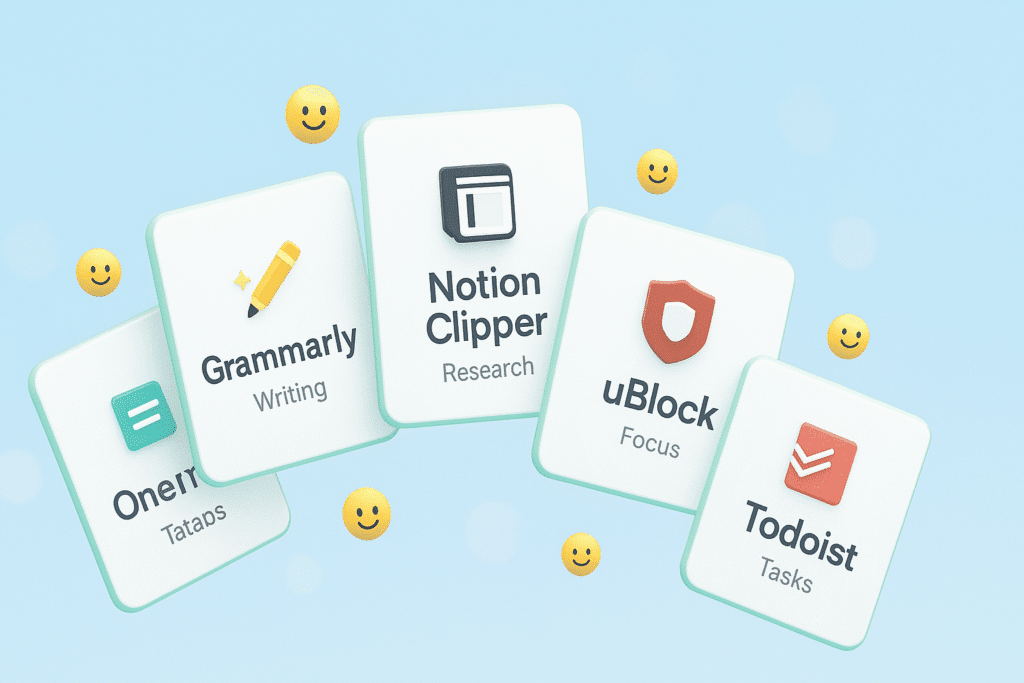
Research-backed tips for choosing extensions (2025 realities)
- Choose reputable sources — install extensions from official websites or the Chrome Web Store and check reviews. Community threads and recent roundups are useful to spot trends. Android AuthorityReddit
- Limit active extensions — each extension can add CPU/memory overhead. Keep only the ones you use daily.
- Review permissions — extensions that request wide access (all websites) should be trusted vendors.
- Use dedicated profiles — create a “study” Chrome profile with only study extensions and a separate “personal” profile to avoid overlap.
Comparison: Lightweight vs power-user stacks
| Stack type | Example extensions | Who it’s for |
|---|---|---|
| Lightweight (minimal) | Grammarly, OneTab, uBlock Origin | Students who want speed & focus |
| Research & notes | Notion Web Clipper, Zotero Connector, OneTab | Researchers and thesis students |
| Productivity-heavy | Todoist, Workona, Momentum, Scribe | People turning courses into paid projects or side-hustles |
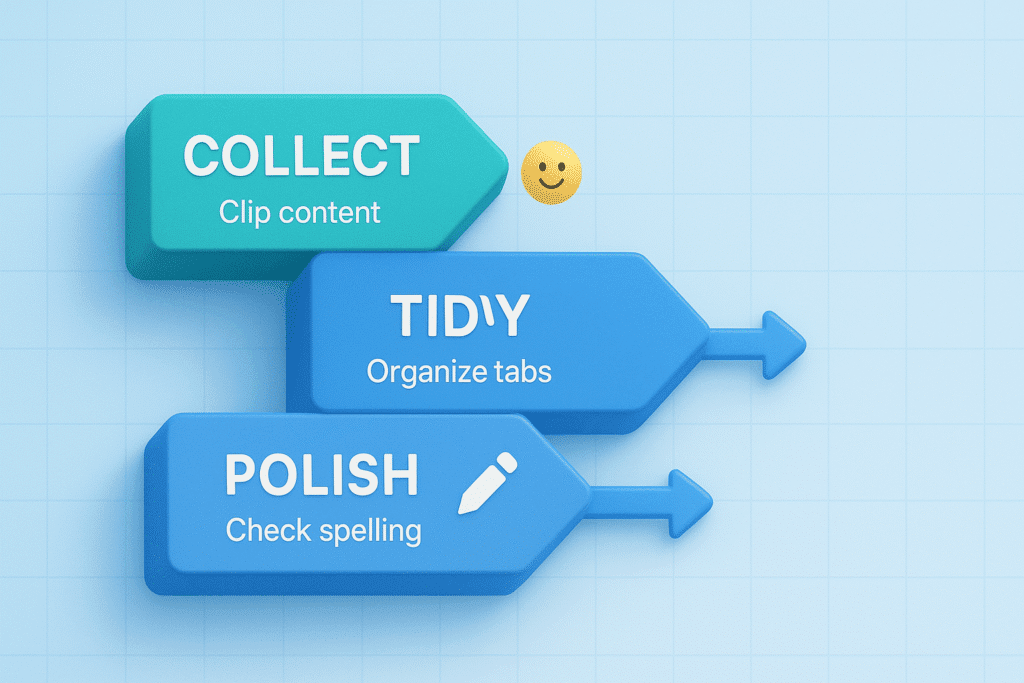
Visual elements & resources to include in your post
- Comparison table (use the one above) — quick scan for readers.
- Screenshots showing one workflow (clip → tidy → task) — helps beginners replicate steps.
- Infographic: “5-step focused session” (Collect → Organize → Plan → Execute → Review).
(Useful reference sources used while researching: Android Authority’s extensions roundup, Zapier’s productivity list, and official product pages for Grammarly and Notion). Android AuthorityZapierGrammarlyNotion

Final thoughts & practical CTA
Extensions are small tools that compound into big gains. Pick a few that solve your weakest link — whether that’s getting distracted, losing research, or submitting sloppy writing — and commit to a simple workflow for two weeks. You’ll be surprised how much smoother online learning feels.
Call to action: Which chrome extension transformed your study workflow? Share it in the comments below. Want a ready-made “study browser” setup? Subscribe to our newsletter and I’ll send a 1-click checklist: recommended extensions, a start-up profile export, and a printable study routine.
Also check our deep-dive guides on E-learning Tools and Mini Projects for hands-on workflows.



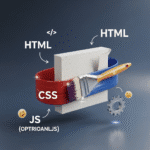
Pingback: How to Apply for Study Abroad Programs in the USA 2025 Guide - PaidScripts -Tech Education Hub: Courses & Student Resources